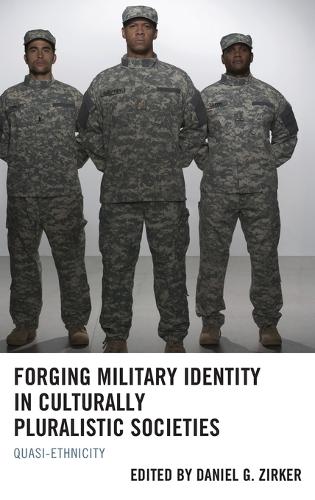
Forging Military Identity in Culturally Pluralistic Societies: Quasi-Ethnicity
(Hardback)
Publishing Details
Forging Military Identity in Culturally Pluralistic Societies: Quasi-Ethnicity
By (Author) Daniel Zirker
Contributions by Ibikunle Adeakin
Contributions by Mamadou Diouma Bah
Contributions by Yassine Belkamel
Contributions by Paulo Gustavo Pellegrino Correa
Contributions by Thomas Stubbs
Contributions by Daniel Zirker
Bloomsbury Publishing PLC
Lexington Books
8th October 2015
United States
Classifications
Professional and Scholarly
Non Fiction
Comparative politics
International relations
Theory of warfare and military science
320.01
Physical Properties
Hardback
154
Width 159mm, Height 236mm, Spine 16mm
372g
Description
Ethno-politics has become a major force in the post-Cold War era. The fundamental challenge to military establishments in deeply plural societies is the formation of institutional unity from diverse ethnic groups. This edited volume examines seven case studies of countries that have attempted, with varying degrees of success, to develop, or to begin to develop, within their military establishments a single quasi-ethnic military identity to effect unity within their ranks and attenuate the deep and often violent ethnic divisions that otherwise would pertain. The volume compares contrasting outcomes in two African regions: West Africa with the contrasting cases of Guinea and Nigeria and East Africa with the cases of Tanzania, Uganda and Kenya. It also examines the very different cases of Algeria and Suriname. In most of these cases, the emergence of a single, unified, quasi-ethnic identity is in its earliest stages, although rapid global change points to the likelihood that this pattern will prevail.
Reviews
This timely and long-overdue compendium sheds light on the role of the military in ethnically divided societies. Going beyond professionalism and class, the study sees the military in divided societies as a quasi ethnic group ready to defend its interest and position in such settings. This is an important contribution to our understanding of political developments in ethnically pluralistic and frequently divided societies. -- Constantine Danopoulos, San Jose State University
Civil-Military Relations in post-colonial, post-Cold War, Africa remains understudied, making Daniel G. Zirkers Forging Military Identity in Culturally Pluralistic Societies: Quasi-Ethnicity a great contribution to this endeavor. By accentuating the challenge African militaries face in maintaining institutional autonomy amidst ethno-political and other socio-cultural rifts afflicting African societies, this book vindicates Morris Janowitzs argument while also unravelling Africa-specific experiences that puzzlingly defy theoretical expectationswhether from an institutional, structural, or identity perspectiveas variations within plural East Africa reveal. The book is highly recommended for policymakers, researchers, and students of African politics. -- Sabastiano Rwengabo, National University of Singapore
Author Bio
Daniel Zirker is professor of political science at the University of Waikato.
